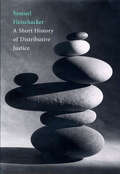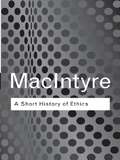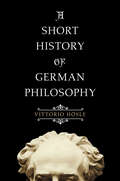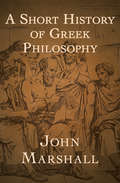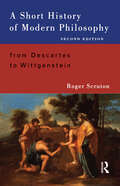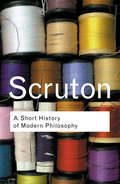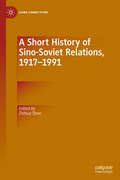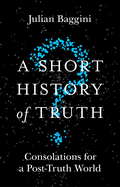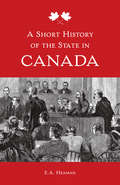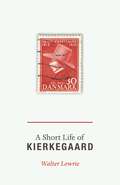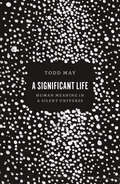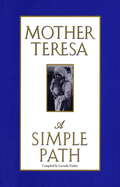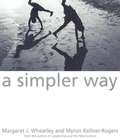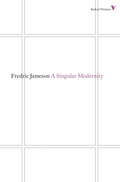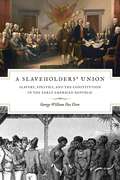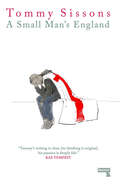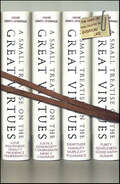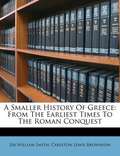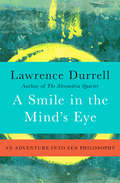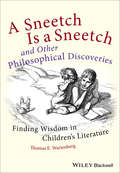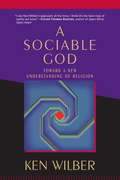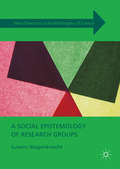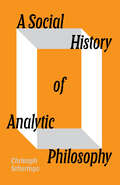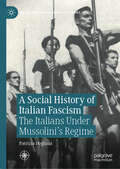- Table View
- List View
A Short History of Distributive Justice
by Samuel FleischackerDistributive justice in its modern sense calls on the state to guarantee that everyone is supplied with a certain level of material means. Samuel Fleischacker argues that guaranteeing aid to the poor is a modern idea, developed only in the last two centuries. Earlier notions of justice, including Aristotle's, were concerned with the distribution of political office, not of property. It was only in the eighteenth century, in the work of philosophers such as Adam Smith and Immanuel Kant, that justice began to be applied to the problem of poverty. To attribute a longer pedigree to distributive justice is to fail to distinguish between justice and charity. Fleischacker explains how confusing these principles has created misconceptions about the historical development of the welfare state. Socialists, for instance, often claim that modern economics obliterated ancient ideals of equality and social justice. Free-market promoters agree but applaud the apparent triumph of skepticism and social-scientific rigor. Both interpretations overlook the gradual changes in thinking that yielded our current assumption that justice calls for everyone, if possible, to be lifted out of poverty. By examining major writings in ancient, medieval, and modern political philosophy, Fleischacker shows how we arrived at the contemporary meaning of distributive justice.
A Short History of Ethics: A History of Moral Philosophy from the Homeric Age to the 20th Century (Routledge Classics)
by Alasdair MacIntyreA Short History of Ethics has over the past thirty years become a key philosophical contribution to studies on morality and ethics. Alasdair MacIntyre writes a new preface for this second edition which looks at the book 'thirty years on' and considers its impact. A Short History of Ethics guides the reader through the history of moral philosophy from the Greeks to contemporary times. MacIntyre emphasises the importance of a historical context to moral concepts and ideas showing the relevance of philosophical queries on moral concepts and the importance of a historical account of ethics. A Short History of Ethics is an important contribution written by one of the most important living philosophers. Ideal for all philosophy students interested in ethics and morality.
A Short History of German Philosophy
by Steven Rendall Vittorio HösleThis concise but comprehensive book provides an original history of German-language philosophy from the Middle Ages to today. In an accessible narrative that explains complex ideas in clear language, Vittorio Hösle traces the evolution of German philosophy and describes its central influence on other aspects of German culture, including literature, politics, and science. Starting with the medieval mystic Meister Eckhart, the book addresses the philosophical changes brought about by Luther's Reformation, and then presents a detailed account of the classical age of German philosophy, including the work of Leibniz and Kant; the rise of a new form of humanities in Lessing, Hamann, Herder, and Schiller; the early Romantics; and the Idealists Fichte, Schelling, and Hegel. The following chapters investigate the collapse of the German synthesis in Schopenhauer, Feuerbach, Marx, and Nietzsche. Turning to the twentieth century, the book explores the rise of analytical philosophy in Frege and the Vienna and Berlin circles; the foundation of the historical sciences in Neo-Kantianism and Dilthey; Husserl's phenomenology and its radical alteration by Heidegger; the Nazi philosophers Gehlen and Schmitt; and the main West German philosophers, including Gadamer, Jonas, and those of the two Frankfurt schools. Arguing that there was a distinctive German philosophical tradition from the mid-eighteenth century to the mid-twentieth century, the book closes by examining why that tradition largely ended in the decades after World War II.A philosophical history remarkable for its scope, brevity, and lucidity, this is an invaluable book for students of philosophy and anyone interested in German intellectual and cultural history.
A Short History of Greek Philosophy
by John MarshallAn overview of the works that form the foundation of Western philosophy The writings of Socrates, Plato, and Aristotle have resonated through the millennia and continue to influence the lives of people today. In A Short History of Greek Philosophy, renowned British classicist John Marshall provides a thorough yet engaging account of the seminal philosophical movements of ancient Greece, from the Sophists to the Sceptics to the Stoics. For readers looking to dip their toes into the vast ocean of Western philosophy, Marshall&’s history provides the perfect springboard. This ebook has been professionally proofread to ensure accuracy and readability on all devices.
A Short History of Modern Philosophy: From Descartes to Wittgenstein (Routledge Classics Ser.)
by Roger ScrutonA Short History of Modern Philosophy is a lucid, challenging and up-to-date survey of the philosophers and philosophies from the founding father of modern philosophy, René Descartes, to the most important and famous philosopher of the twentieth century, Ludwig Wittgenstein. Roger Scruton has been widely praised for his success in making the history of modern philosophy cogent and intelligible to anyone wishing to understand this fascinating subject. In this new edition, he has responded to the explosion of interest in the history of philosophy by substantially rewriting the book, taking account of recent debates and scholarship.
A Short History of Modern Philosophy: From Descartes to Wittgenstein (Routledge Classics)
by Roger ScrutonDiscover for yourself the pleasures of philosophy! Written both for the seasoned student of philosophy as well as the general reader, the renowned writer Roger Scruton provides a survey of modern philosophy. Always engaging, Scruton takes us on a fascinating tour of the subject, from founding father Descartes to the most important and famous philosopher of the twentieth century, Ludwig Wittgenstein. He identifies all the principal figures as well as outlines of the main intellectual preoccupations that have informed western philosophy. Painting a portrait of modern philosophy that is vivid and animated, Scruton introduces us to some of the greatest philosophical problems invented in this period and pursued ever since. Including material on recent debates, A Short History of Modern Philosophy is already established as the classic introduction. Read it and find out why.
A Short History of Sino-Soviet Relations, 1917–1991 (China Connections)
by Zhihua ShenDrawing on the rich trove of recently declassified Russian and Chinese archival materials, this history of Sino-Soviet relations in the 20th century sheds new light on key events during this period. It offers fresh insights into the role of ideology and national interests in the evolution of the complex and turbulent relationship between not just the two countries but also their respective Communist Parties. The chapters on the normalization of bilateral ties provide an in-depth analysis of divisions in the socialist camp that culminated in both its collapse and the disintegration of the Soviet Union. The book argues that 20th century Sino-Soviet relations reflected both long-standing and emerging political and geopolitical challenges facing members of the Cold War socialist camp, in particular tensions between the ideal of internationalism and national aspirations, between commitment to the principle of sovereignty and commitment to that of equality in international relations, and between inter-party relations and inter-state relations. This makes for a valuable addition to the reading lists of all those interested in the development of the relationship between two of the world’s most important countries.
A Short History of Truth: Consolations For A Post-truth World
by Julian BagginiHow did we find ourselves in a "post-truth" world of "alternative facts"? And can we get out of it? A Short History of Truth sets out to answer these questions by looking at the complex history of truth and falsehood. It identifies ten types of supposed truth and explains how easily each can become the midwife of falsehood. There is no species of truth that we can rely on unquestioningly, but that does not mean the truth can never be established. Attaining truth is an achievement we need to work for, and each chapter will end up with a truth we can have some confidence in.This history builds into a comprehensive and clear explanation of why truth is now so disputed by exploring 10 kinds of truth:1. Eternal truths.2. Authoritative truths.3. Esoteric truths.4. Reasoned truths.5. Evidence-based truths.6. Creative truths.7. Relative truths. 8. Powerful truths9. Moral truths.10. Holistic truths. Baggini provides us with all we need to restore faith in the value and possibility of truth as a social enterprise. Truth-seekers need to be sceptical not cynical, autonomous not atomistic, provisional not dogmatic, open not empty, demanding not unreasonable.
A Short History of Truth: Consolations for a Post-Truth World
by Julian BagginiHow did we find ourselves in a "post-truth" world of "alternative facts"? And can we get out of it? A Short History of Truth sets out to answer these questions by looking at the complex history of truth and falsehood. It identifies ten types of supposed truth and explains how easily each can become the midwife of falsehood. There is no species of truth that we can rely on unquestioningly, but that does not mean the truth can never be established. Attaining truth is an achievement we need to work for, and each chapter will end up with a truth we can have some confidence in.This history builds into a comprehensive and clear explanation of why truth is now so disputed by exploring 10 kinds of truth:1. Eternal truths.2. Authoritative truths.3. Esoteric truths.4. Reasoned truths.5. Evidence-based truths.6. Creative truths.7. Relative truths. 8. Powerful truths9. Moral truths.10. Holistic truths. Baggini provides us with all we need to restore faith in the value and possibility of truth as a social enterprise. Truth-seekers need to be sceptical not cynical, autonomous not atomistic, provisional not dogmatic, open not empty, demanding not unreasonable.
A Short History of the State in Canada
by E. A. HeamanA concise, elegant survey of a complex aspect of Canadian history, A Short History of the State in Canada examines the theory and reality of governance within Canada's distinctive political heritage: a combination of Indigenous, French, and British traditions, American statism and anti-statism, and diverse, practical experiments and experiences.E.A. Heaman takes the reader through the development of the state in both principle and practice, examining Indigenous forms of government before European contact; the interplay of French and British colonial institutions before and after the Conquest of New France; the creation of the nineteenth-century liberal state; and, finally, the rise and reconstitution of the modern social welfare state. Moving beyond the history of institutions to include the development of political cultures and social politics, A Short History of the State in Canada is a valuable introduction to the topic for political scientists, historians, and anyone interested in Canada's past and present.
A Short Life of Kierkegaard
by Walter LowrieA small, insignificant-looking intellectual with absurdly long legs, Søren Kierkegaard (1813-1855) was a veritable Hans Christian Andersen caricature of a man. A strange combination of witty cosmopolite and melancholy introvert, he spent years writing under a series of fantastical pseudonyms, lavishing all the splendor of his magnificent mind on a seldom-appreciative world. He had a tragic love affair with a young girl, was dominated by an unforgettable Old Testament father, fought a sensational literary duel with a popular satiric magazine, and died in the midst of a violent quarrel with the state church for which he had once studied theology. Yet this iconoclast produced a number of brilliant books that have profoundly influenced modern thought. In this classic biography, the celebrated Kierkegaard translator Walter Lowrie presents a charming and warmly appreciative introduction to the life and work of the great Danish writer. Lowrie tells the story of Kierkegaard's emotionally turbulent life with a keen sense of drama and an acute understanding of how his life shaped his thought. The result is a wonderfully informative and entertaining portrait of one of the most important thinkers of the past two centuries. This edition also includes Lowrie's wry essay "How Kierkegaard Got into English," which tells the improbable story of how Lowrie became one of Kierkegaard's principal English translators despite not learning Danish until he was in his 60s, as well as a new introduction by Kierkegaard scholar Alastair Hannay.
A Significant Life: Human Meaning in a Silent Universe
by Todd MayWhat makes for a good life, or a beautiful one, or, perhaps most important, a meaningful one? Throughout history most of us have looked to our faith, our relationships, or our deeds for the answer. But in A Significant Life, philosopher Todd May offers an exhilarating new way of thinking about these questions, one deeply attuned to life as it actually is: a work in progress, a journey--and often a narrative. Offering moving accounts of his own life and memories alongside rich engagements with philosophers from Aristotle to Heidegger, he shows us where to find the significance of our lives: in the way we live them. May starts by looking at the fundamental fact that life unfolds over time, and as it does so, it begins to develop certain qualities, certain themes. Our lives can be marked by intensity, curiosity, perseverance, or many other qualities that become guiding narrative values. These values lend meanings to our lives that are distinct from--but also interact with--the universal values we are taught to cultivate, such as goodness or happiness. Offering a fascinating examination of a broad range of figures--from music icon Jimi Hendrix to civil rights leader Fannie Lou Hamer, from cyclist Lance Armstrong to The Portrait of a Lady's Ralph Touchett to Claus von Stauffenberg, a German officer who tried to assassinate Hitler--May shows that narrative values offer a rich variety of criteria by which to assess a life, specific to each of us and yet widely available. They offer us a way of reading ourselves, who we are, and who we might like to be. Clearly and eloquently written, A Significant Life is a recognition and a comfort, a celebration of the deeply human narrative impulse by which we make--even if we don't realize it--meaning for ourselves. It offers a refreshing way to think of an age-old question, of quite simply, what makes a life worth living.
A Simple Path
by Mother TeresaKnown around the globe for her indefatigable work on behalf of the poor, the sick, and the dying, Mother Teresa has devoted her life to giving hope to the hopeless in more than one hundred and twenty countries. She inspires us all to find a way to translate our spiritual beliefs into action in the world. How has one woman accomplished so much? And what are the guiding principles that have enabled this humble nun to so profoundly effect the lives of millions? Now, in her own words, Mother Teresa shares the thoughts and experiences that have led her to do her extraordinary charitable work. A candid look at her everyday life--at the very simplicity and self-sacrifice that give her the strength to move mountains--A Simple Path gives voice to the remarkable spirit who has dedicated her life to the poorest among us. Just as important as her beliefs are how they are put into action in the world, and A Simple Path also tells the story of the founding of the Missionaries of Charity, their purpose and practice, and the results of their tireless work. Through faith, surrender, and prayer, the missionaries live to serve others; they have improved the lives of countless souls and given dignity to the dying. Their mission has also produced a ripple effect, spreading human compassion to communities where there is need. Through these examples, as well as the uplifting words and guiding prayers of Mother Teresa and those who work with her, everyone can learn how to walk the simple path that Mother Teresa has laid out for us, to help create a truly kinder world for the future. A Simple Path is a unique spiritual guide for Catholics and non-Catholics alike: full of wisdom and hope from the one person who has given us the greatest model of love in action in our time.
A Simpler Way
by Margaret J. Wheatley Myron Kellner-RogersWe want life to be less arduous and more delightful. We want to be able to think differently about how to organize human activities. Our book springs from these desires. It explores a different way of thinking about life and about how organizing might occur. Our primary question is: How could we organize human endeavor if we developed different understandings of how life organizes itself? We ask this question for all of us, for there is no one who is unaffected by the organizations we humans have created.
A Singular Modernity
by Fredric JamesonThe concepts of modernity and modernism are amongst the most controversial and vigorously debated in contemporary philosophy and cultural theory. In this intervention, Fredric Jameson--perhaps the most influential and persuasive theorist of postmodernity--excavates and explores these notions in a fresh and illuminating manner.The extraordinary revival of discussions of modernity, as well as of new theories of artistic modernism, demands attention in its own right. It seems clear that the (provisional) disappearance of alternatives to capitalism plays its part in the universal attempt to revive 'modernity' as a social ideal. Yet the paradoxes of the concept illustrate its legitimate history and suggest some rules for avoiding its misuse as well.In this major interpretation of the problematic, Jameson concludes that both concepts are tainted, but nonetheless yield clues as to the nature of the phenomena they purported to theorize. His judicious and vigilant probing of both terms--which can probably not be banished at this late date--helps us clarify our present political and artistic situations.From the Trade Paperback edition.
A Slaveholders' Union: Slavery, Politics, and the Constitution in the Early American Republic
by George William Van CleveAfter its early introduction into the English colonies in North America, slavery in the United States lasted as a legal institution until the passage of the Thirteenth Amendment to the Constitution in 1865. But increasingly during the contested politics of the early republic, abolitionists cried out that the Constitution itself was a slaveowners’ document, produced to protect and further their rights. A Slaveholders’ Union furthers this unsettling claim by demonstrating once and for all that slavery was indeed an essential part of the foundation of the nascent republic. In this powerful book, George William Van Cleve demonstrates that the Constitution was pro-slavery in its politics, its economics, and its law. He convincingly shows that the Constitutional provisions protecting slavery were much more than mere “political” compromises—they were integral to the principles of the new nation. By the late 1780s, a majority of Americans wanted to create a strong federal republic that would be capable of expanding into a continental empire. In order for America to become an empire on such a scale, Van Cleve argues, the Southern states had to be willing partners in the endeavor, and the cost of their allegiance was the deliberate long-term protection of slavery by America’s leaders through the nation’s early expansion. Reconsidering the role played by the gradual abolition of slavery in the North, Van Cleve also shows that abolition there was much less progressive in its origins—and had much less influence on slavery’s expansion—than previously thought. Deftly interweaving historical and political analyses, A Slaveholders’ Union will likely become the definitive explanation of slavery’s persistence and growth—and of its influence on American constitutional development—from the Revolutionary War through the Missouri Compromise of 1821.
A Small Man's England
by Tommy SissonsAn exploration of white working-class English men, showing how and why some have been captured by the far-right and what the left can do about it.IS THE WHITE WORKING CLASS RIGHT-WING? AND IS IT RIGHT-WING TO EVEN SPEAK OF A "WHITE WORKING CLASS"? In recent decades, as class consciousness has been suppressed and eroded, many white working-class men have turned their backs on the left in favour of the right and the far-right. Why is this? A Small Man's England is a polemic aimed at the structures of hierarchy that ceaselessly maintain power across Britain and elsewhere, and a call for multicultural solidarity amongst the working class. In analysing the roles that class, race, masculinity and nationality play in neoliberal Britain, Sissons offers a solution to the indoctrination of white working-class English men by the right and the far-right, and explores how working-class people can collectively shape a "Common England" -- a country based on equality and justice for all.
A Small Treatise on the Great Virtues: The Uses of Philosophy in Everyday Life
by André Comte-SponvilleAn utterly original exploration of the timeless human virtues and how they apply to the way we live now, from a bold and dynamic French writer.In this graceful, incisive book, writer-philosopher André Comte-Sponville reexamines the classic human virtues to help us under-stand "what we should do, who we should be, and how we should live." In the process, he gives us an entirely new perspective on the value, the relevance, and even the charm of the Western ethical tradition.Drawing on thinkers from Aristotle to Simone Weil, by way of Aquinas, Kant, Rilke, Nietzsche, Spinoza, and Rawls, among others, Comte-Sponville elaborates on the qualities that constitute the essence and excellence of humankind. Starting with politeness -- almost a virtue -- and ing with love -- which transcs all morality -- A Small Treatise on the Great Virtues takes us on a tour of the eighteen essential virtues: fidelity, prudence, temperance, courage, justice, generosity, compassion, mercy, gratitude, humility, simplicity, tolerance, purity, gentleness, good faith, and even, surprisingly, humor.Sophisticated and lucid, full of wit and vivacity, this modestly titled yet immensely important work provides an indispensable guide to finding what is right and good in everyday life.
A Smaller History of Greece: from the Earliest Times to the Roman Conquest
by William SmithThe literary education of a Spartan youth was of a most restricted kind. He was taught to despise literature as unworthy of a warrior,while the study of eloquence and philosophy, which were cultivated at Athens with such extraordinary success, was regarded at Sparta with contempt. <P> <P> -from Chapter IV Intended for school use, this 1865 abridgement of Smith's more comprehensive History of Greece is an excellent introduction to classical history for readers of all ages. <P> <P> From the geography and distant origins of the Greek nation and culture to the Greek colonies and Persian and Peloponnesian Wars through the conquests of Alexander the Great, this clear, concise, highly readable work is a pocket-size Greek history for antiquity buffs to treasure and refer to again and again. British classicist and lexicographer SIR WILLIAM SMITH (1813¬-1893) was editor of the Quarterly Review, and also wrote Dictionary of Greek and Roman Antiquities (1842), Dictionary of Greek and Roman Biography and Mythology (1849), and Dictionary of Greek and Roman Geography (1857).
A Smile in the Mind's Eye: An Adventure into Zen Philosophy
by Lawrence DurrellThe &“virtuoso&” author&’s memoir of his spiritual journey with famed Taoist philosopher Jolan Chang (The New York Times). Beginning with their first meeting over lunch at Lawrence Durrell&’s Provencal home, Durrell and Jolan Chang—renowned Taoist philosopher and expert on Eastern sexuality—developed an enduring relationship based on mutual spiritual exploration. Durrell&’s autobiographical rumination on their friendship and on Taoism recounts the author&’s existential ponderings, starting with his introduction to the mystical and enigmatic &“smile in the mind&’s eye.&” From parsimony, cooking, and yoga to poetry, Petrarch, and Nietzche, A Smile in the Mind&’s Eye is a charming tale of a writer&’s spiritual and philosophical awakening.
A Sneetch is a Sneetch and Other Philosophical Discoveries
by Thomas E. WartenbergTaking Picture Books Seriously: What can we learn about philosophy through children's books?This warm and charming volume casts a spell on adult readers as it unveils the surprisingly profound philosophical wisdom contained in children's picture books, from Dr Seuss's Sneetches to William Steig's Shrek!. With a light touch and good humor, Wartenberg discusses the philosophical ideas in these classic stories, and provides parents with a practical starting point for discussing philosophical issues with their children. Accessible and multi-layered, it answers questions like, Is it okay for adults to deceive kids? What's the difference between saying the Mona Lisa is a great painting and vanilla is your favorite flavor? Each chapter includes illustrations commissioned especially for this book.
A Sociable God: Toward a New Understanding of Religion
by Ken Wilber Roger WalshIn one of the first attempts to bring an integral dimension to sociology, Ken Wilber introduces a system of reliable methods by which to make testable judgments of the authenticity of any religious movement. A Sociable God is a concise work based on Wilber's "spectrum of consciousness" theory, which views individual and cultural development as an evolutionary continuum. Here he focuses primarily on worldviews (archaic, magic, mythic, mental, psychic, subtle, causal, nondual) and evaluates various cultural and religious movements on a scale ranging from egocentric to ethnocentric to worldcentric to Kosmic. By using this integral view, Wilber hopes, society would be able to discriminate between dangerous cults and authentic spiritual paths. In addition, he points out why these distinctions are crucial in understanding spiritual experiences and altered states of consciousness. In a lengthy new introduction, the author brings the reader up to date on his latest integral thinking and concludes that, for the succinct and elegant way it argues for a sociology of depth, A Sociable God remains a clarion call for a greater sociology.
A Social Epistemology of Research Groups: Collaboration In Scientific Practice (New Directions in the Philosophy of Science)
by Susann WagenknechtThis book investigates how collaborative scientific practice yields scientific knowledge. At a time when most of today's scientific knowledge is created in research groups, the author reconsiders the social character of science to address the question of whether collaboratively created knowledge should be considered as collective achievement, and if so, in which sense. Combining philosophical analysis with qualitative empirical inquiry, this book provides a comparative case study of mono- and interdisciplinary research groups, offering insight into the day-to-day practice of scientists. The book includes field observations and interviews with scientists to present an empirically-grounded perspective on much-debated questions concerning research groups' division of labor, relations of epistemic dependence and trust.
A Social History of Analytic Philosophy
by Christoph SchuringaHow a supposedly apolitical form of philosophy owes its continuing power to social and political forcesAnalytic philosophy is the leading form of philosophy in the English-speaking world. What explains its continued success? Christoph Schuringa argues that its enduring power can only be understood by examining its social history. Analytic philosophy tends to think of itself as concerned with eternal questions, transcending the changing scenes of history. It thinks of itself as apolitical. This book, however, convincingly shows that the opposite is true.The origins of analytic philosophy are in a set of distinct movements, shaped by high-ly specific sets of political and social forces. Only after the Second World War were these disparate, often dynamic movements joined together to make &‘analytic philosophy&’ as we know it. In the climate of McCarthyism, analytic philosophy was robbed of political force.To this day, analytic philosophy is the ideology of the status quo. It may seem arcane and largely removed from the real world, but it is a crucial component in upholding liberalism, through its central role in elite educational institutions. As Schuringa concludes, the apparently increasing friendliness of analytic philosophers to rival approaches in philosophy should be understood as a form of colonization; thanks to its hegemonic status, it reformats all it touches in service of its own imperatives, going so far as to colonize decolonial efforts in the discipline.
A Social History of Italian Fascism: The Italians Under Mussolini’s Regime (Italian and Italian American Studies)
by Patrizia DoglianiThis book uncovers how fascism reshaped Italian society according to its ideological and historical interpretation of the Italian nation and people and identifies the strengths of this transformation, but also the resistance encountered from, for example, women and minority groups, to accept it in everyday life. It analyzes the success achieved by some policies aimed at popular masses in order to integrate them into the nation, and how fascism initiated an early welfare state project to address specific categories of society such as veterans, families, mothers and children. The book also questions the concept and practices of social citizenship reserved only for those who gave evidence of formal adherence to fascism.
